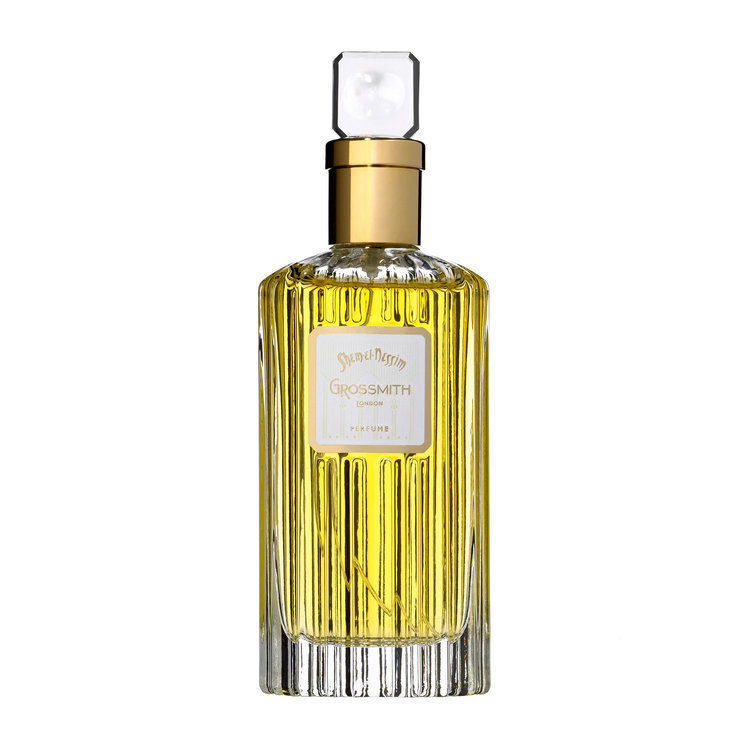Shem el Nessim - Grossmith London
Shem-el-Nessim, Grossmith London
Shem-el Nessim
by Trevor Nicholl
for Grossmith London
Words alone could not express the beauty of this ochre-spirited land, to describe in a sentence that would not seem a lie the invisible roll of dunes, their inaudible song that one hears not but in the midst of night, terrible and humid, the night that rises here when India, so they say, blows over her monsoon winds. One must behold the foam of turquoise waters crashing against selenite coasts, bitter and white, carven as if with iron and storm. One must have tasted the salty breeze of warming seas and the incense burning in the streets. One must have caught the glance of these women, cloaked with dignity and black as the dowagers of yore, their glance dripping with the sensuality of a land hidden behind doleful veils. There reigns in these sun-ruled alleys a sublime quietude, and mystical too, a taste of silence one finds no longer in the cities of the West.
All there smells of love and prayer. The scorching heat itself couldn’t rob the tan-skinned men of their joy, the white-haired princes who tame both sea and sand with the haughty pride of famed sultans. They are pearl-divers for most, or caravan riders, and know better than any their ever-changing horizon, the deserts and the oceans and their waves of coral and gold. Ah, how I wish you had seen them, the Apostle-figured Saracens and their beards glistening with perfumed oils! Ah, if you could smell them, if only I could send with these words the wafts that reap my soul: the frankincense burning in the cupboard, a purple-coloured blend of olibanum, labdanum and amber deep like red chypre and the soft and crackling warmth of cedarwood beams, in copper thrown.
How I long to see you once more, how I long to hold you here, tight in my arms, in the shadow of the pitch-black volcano that watches over the town like a cyclop fallen into sleep. Here, my love, you would taste their hospitality and night-dark coffee, infused with cardamom and amber and saffron. I know of no place here that is not fragrant, there is no place here that isn’t ripe with the smell of a good earth – peaches drying in an indigo skiff, roses worn here by men as of jewels and the nectar of sun-fruits, of citruses unknown even to our lips, sort of little limes bitter and starry. Sometimes even, when the desert wind blows again the breeze, there rises in the sky some drawings of sand, Eastern lights burning in the dusk; and there comes down in the city a wind so hot, carrying with it forgotten fragrances, the strings of an oasis. The salty breeze bows before the might of sunken cities, the air smells of incense and vanilla heated through the dunes, of dates and figs and narcotic flowers one finds no longer but in the palm tree groves that a sheikh, somewhere, secretly grows – and the seraglio winds vanish before the hallowed wafts that caress the jasmine walls of the Meccan city.
We will return together, my love, and you too shall smell the fragrance of the breeze.
Shem-el-Nessim appears to be the fragrance of a dream, of an imaginary correspondence between two lovers which Arabia separates. Ancient yet not dated, quintessentially victorian by its history and its fabled vision of the East, it sends our senses on a journey out of time although ironically, it was borne out of the faetid, beating heart of London still at the height of its glory, the capital city of the known world, the metropolis of an Empire without dusk.
The languorous and tenacious rhythm of ylang-ylang and jasmine hushes into a waxy, leathery iris butter. The density of its heart could fool anyone into thinking they are smelling a vintage edition of L’Heure Bleue minus the over-vanillic gourmandise. Classy, obsequious, gliding on one’s skin like a diamond necklace, Shem-el-Nessim is as luxurious as the landscapes it portrays, though retaining, still, the modesty of a victorian England of which it was an ambassador after all. One discovers a lavender-coloured pudor, a period of visiting cards, love letters and white gloves and one reads between its honey-ambered lines, the clandestine loves that raged at the time behind shut veils. This is an orientalist perfume more for so it’s built on a bouquet of heavy and exotic flowers rather than on ouds; on indolic absolutes rather than ambery woods. The rose here has been switched with jasmine, violet and heliotrope as if they spoke of the immaculate whiteness of pearls and Emirati robes. The result is a multicoloured fragrance, way more than the monochromatic seashore of the Persian Gulf.
Many and one have delved on the similarity between Shem-el-Nessim and L’Origan yet I want to believe that Shem-el-Nessim has a sensual “je ne sais quoi” which L’Origan lacked and L’Heure Bleue lost which is why, perhaps, it became so popular in its time, for it aptly figures the image of the Middle-East that was carried through the paintings and the rest of the arts, bringing alive the mysterious mistiness of women lavishly perfuming themselves with incense and the golden-gilded haze of steam-filled harems. Yes, Shem-el-Nessim is a resolute English fantasy, more regal surely than its revolutionary French cousins, it has the devastating beauty of a swan-song, of the last ray of sunlight shining over the Empire ere its first sunset, of a Europe trapped in so many layers of silk it could not fathom the atrocity of the First World War. Insouciant and naïve like a 19th century bridegroom walking down the aisle, Shem-el-Nessim is touching, heartwarming, comforting.
In this perhaps it triumphs where the new arrivistes and the old modernists have failed. It does not pretend to reinvent the world of perfumery, instead it is proud to return to its origins, honouring the heroes which names are remembered whilst their scent are forgotten. One thinks of Coty and Guerlain, of Shalimar and l’Origan and all the others that fashion and the passing century have condemned to oblivion. Therein maybe lies its modernity – to not be vintage yet retain this elegance, this antiquated writing, conforming to the latest regulations yet remaining complex in the way old formulae were with their intricate layering of materials and bases and lines in which molecules appear many times in many ways, these “drawer” guerlinades which repeat themselves over and over again without ever reiterating, like a counterpoint developing into a choral symphony of colours and odours.
Shem-el-Nessim - Grossmith London
EdP: 50ml, 100ml - £185, £265
Perfume: 15ml, 50ml, 100ml - £175, £375, £495
For more information, visit the website.




